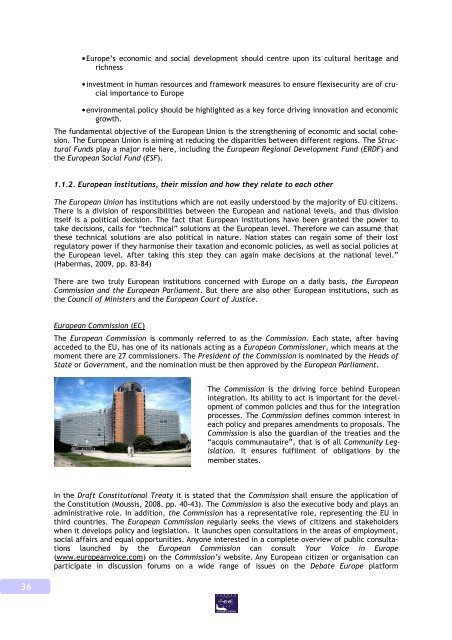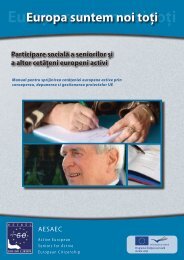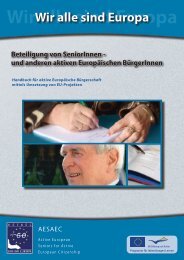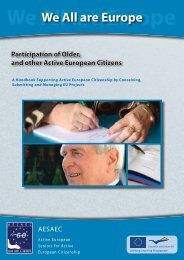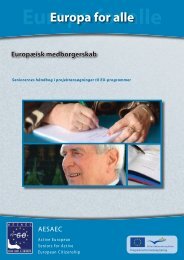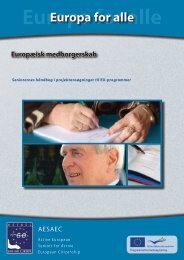We All are Europe - AESAEC
We All are Europe - AESAEC
We All are Europe - AESAEC
You also want an ePaper? Increase the reach of your titles
YUMPU automatically turns print PDFs into web optimized ePapers that Google loves.
• <strong>Europe</strong>’s economic and social development should centre upon its cultural heritage and<br />
richness<br />
• investment in human resources and framework measures to ensure flexisecurity <strong>are</strong> of crucial<br />
importance to <strong>Europe</strong><br />
• environmental policy should be highlighted as a key force driving innovation and economic<br />
growth.<br />
The fundamental objective of the <strong>Europe</strong>an Union is the strengthening of economic and social cohesion.<br />
The <strong>Europe</strong>an Union is aiming at reducing the disparities between different regions. The Structural<br />
Funds play a major role here, including the <strong>Europe</strong>an Regional Development Fund (ERDF) and<br />
the <strong>Europe</strong>an Social Fund (ESF).<br />
1.1.2. <strong>Europe</strong>an institutions, their mission and how they relate to each other<br />
The <strong>Europe</strong>an Union has institutions which <strong>are</strong> not easily understood by the majority of EU citizens.<br />
There is a division of responsibilities between the <strong>Europe</strong>an and national levels, and thus division<br />
itself is a political decision. The fact that <strong>Europe</strong>an institutions have been granted the power to<br />
take decisions, calls for “technical” solutions at the <strong>Europe</strong>an level. Therefore we can assume that<br />
these technical solutions <strong>are</strong> also political in nature. Nation states can regain some of their lost<br />
regulatory power if they harmonise their taxation and economic policies, as well as social policies at<br />
the <strong>Europe</strong>an level. After taking this step they can again make decisions at the national level.”<br />
(Habermas, 2009, pp. 83-84)<br />
There <strong>are</strong> two truly <strong>Europe</strong>an institutions concerned with <strong>Europe</strong> on a daily basis, the <strong>Europe</strong>an<br />
Commission and the <strong>Europe</strong>an Parliament. But there <strong>are</strong> also other <strong>Europe</strong>an institutions, such as<br />
the Council of Ministers and the <strong>Europe</strong>an Court of Justice.<br />
<strong>Europe</strong>an Commission (EC)<br />
The <strong>Europe</strong>an Commission is commonly referred to as the Commission. Each state, after having<br />
acceded to the EU, has one of its nationals acting as a <strong>Europe</strong>an Commissioner, which means at the<br />
moment there <strong>are</strong> 27 commissioners. The President of the Commission is nominated by the Heads of<br />
State or Government, and the nomination must be then approved by the <strong>Europe</strong>an Parliament.<br />
The Commission is the driving force behind <strong>Europe</strong>an<br />
integration. Its ability to act is important for the development<br />
of common policies and thus for the integration<br />
processes. The Commission defines common interest in<br />
each policy and prep<strong>are</strong>s amendments to proposals. The<br />
Commission is also the guardian of the treaties and the<br />
“acquis communautaire”, that is of all Community Legislation.<br />
It ensures fulfilment of obligations by the<br />
member states.<br />
In the Draft Constitutional Treaty it is stated that the Commission shall ensure the application of<br />
the Constitution (Moussis, 2008. pp. 40-43). The Commission is also the executive body and plays an<br />
administrative role. In addition, the Commission has a representative role, representing the EU in<br />
third countries. The <strong>Europe</strong>an Commission regularly seeks the views of citizens and stakeholders<br />
when it develops policy and legislation. It launches open consultations in the <strong>are</strong>as of employment,<br />
social affairs and equal opportunities. Anyone interested in a complete overview of public consultations<br />
launched by the <strong>Europe</strong>an Commission can consult Your Voice in <strong>Europe</strong><br />
(www.europeanvoice.com) on the Commission’s website. Any <strong>Europe</strong>an citizen or organisation can<br />
participate in discussion forums on a wide range of issues on the Debate <strong>Europe</strong> platform<br />
36


